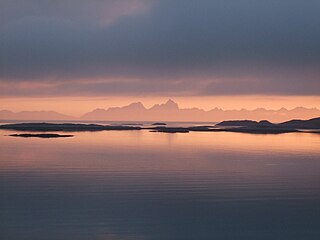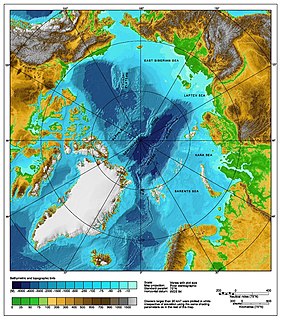
The Norwegian Sea is a marginal sea in the Atlantic Ocean, northwest of Norway between the North Sea and the Greenland Sea, adjoining the Barents Sea to the northeast. In the southwest, it is separated from the Atlantic Ocean by a submarine ridge running between Iceland and the Faroe Islands. To the north, the Jan Mayen Ridge separates it from the Greenland Sea.
The North Atlantic Salmon Conservation Organization (NASCO) is a specialised regional fishery management organisation established under the Convention for the Conservation of Salmon in the North Atlantic Ocean from 1 October 1983.

The Atlantic cod is a benthopelagic fish of the family Gadidae, widely consumed by humans. It is also commercially known as cod or codling. Dry cod may be prepared as unsalted stockfish, and as cured salt cod or clipfish.

The Barents Sea is a marginal sea of the Arctic Ocean, located off the northern coasts of Norway and Russia and divided between Norwegian and Russian territorial waters. Known among Russians in the Middle Ages as the Murman Sea, the current name of the sea is after the historical Dutch navigator Willem Barentsz.
The International Council for the Exploration of the Sea is a regional fishery advisory body and the world's oldest intergovernmental science organization. ICES is headquartered in Copenhagen, Denmark, where its multinational secretariat staff of 51 provide scientific, administrative and secretarial support to the ICES community. It was established on July 22, 1902, in Copenhagen.

The terms international waters or trans-boundary waters apply where any of the following types of bodies of water transcend international boundaries: oceans, large marine ecosystems, enclosed or semi-enclosed regional seas and estuaries, rivers, lakes, groundwater systems (aquifers), and wetlands.

The Common Fisheries Policy (CFP) is the fisheries policy of the European Union (EU). It sets quotas for which member states are allowed to catch each type of fish, as well as encouraging the fishing industry by various market interventions. In 2004 it had a budget of €931 million, approximately 0.75% of the EU budget.
The Northwest Atlantic Fisheries Organization (NAFO) is an intergovernmental organization with a mandate to provide scientific advice and management of fisheries in the northwestern part of the Atlantic Ocean. NAFO is headquartered in Halifax, Nova Scotia, Canada.

Greenland, an autonomous territory within the Kingdom of Denmark is one of the EU members’ overseas countries and territories (OCT) associated to the European Union. Greenland receives funding from the EU for sustainable development and has signed agreements increasing cooperation with the EU.
A regional fishery body (RFB) is a type of international organization that is dedicated to the sustainability of fishery resources in a particular region, or of highly migratory species. An RFB is classified as one of the following two types:

The Convention for the Protection of the Marine Environment of the North-East Atlantic or OSPAR Convention is the current legislative instrument regulating international cooperation on environmental protection in the North-East Atlantic. Work carried out under the convention is managed by the OSPAR Commission, which is made up of representatives of the Governments of the 15 signatory nations, and representatives of the European Commission, representing the European Union.

The Arctic consists of land, internal waters, territorial seas, exclusive economic zones (EEZs) and international waters above the Arctic Circle. All land, internal waters, territorial seas and EEZs in the Arctic are under the jurisdiction of one of the eight Arctic coastal states: Canada, Denmark, Finland, Iceland, Norway, Russia, Sweden and the United States. International law regulates this area as with other portions of Earth.

Vessel Monitoring Systems (VMS) is a general term to describe systems that are used in commercial fishing to allow environmental and fisheries regulatory organizations to track and monitor the activities of fishing vessels. They are a key part of monitoring control and surveillance (MCS) programs at national and international levels. VMS may be used to monitor vessels in the territorial waters of a country or a subdivision of a country, or in the Exclusive Economic Zones (EEZ) that extend 200 nautical miles (370.4 km) from the coasts of many countries. VMS systems are used to improve the management and sustainability of the marine environment, through ensuring proper fishing practices and the prevention of illegal fishing, and thus protect and enhance the livelihoods of fishermen.
The South East Atlantic Fisheries Organisation (SEAFO) is an organization that maintains controls over fishing and fishing related acts in the Southeastern Atlantic Ocean.

The coastline of the Russian Federation is the fourth longest in the world after the coastlines of Canada, Greenland, and Indonesia. The Russian fishing industry has an exclusive economic zone (EEZ) of 7.6 million km2 including access to twelve seas in three oceans, together with the landlocked Caspian Sea and more than two million rivers.

Cod fisheries are fisheries for cod. Cod is the common name for fish of the genus Gadus, belonging to the family Gadidae, and this article is confined to three species that belong to this genus: the Atlantic cod, the Pacific cod and the Greenland cod. Although there is a fourth species of the cod genus Gadus, Alaska pollock, it is commonly not called cod and therefore currently not covered here.

Arctic cooperation and politics are partially coordinated via the Arctic Council, composed of the eight Arctic nations: the United States, Canada, Iceland, Norway, Sweden, Finland, Russia, and Denmark with Greenland and the Faroe Islands. The dominant governmental power in Arctic policy resides within the executive offices, legislative bodies, and implementing agencies of the eight Arctic nations, and to a lesser extent other nations, such as United Kingdom, Germany, European Union and China. NGOs and academia play a large part in Arctic policy. Also important are intergovernmental bodies such as the United Nations and NATO.
The Arctic Policy of the Kingdom of Denmark defines the Kingdom's foreign relations and policies with other Arctic countries, and the Kingdom's Strategy for the Arctic on issues occurring within the geographic boundaries of "the Arctic" or related to the Arctic or its peoples. The Kingdom of Denmark is an Arctic nation with the importance of The unity of the Realm with Denmark in Europe and the self-governing autonomous countries - Greenland in the Arctic and the Faroe Islands in the North Atlantic.
Illegal, unreported and unregulated fishing (IUU) in the Arctic is an under researched scientific field. The most recent academic articles about IUU in the Arctic mainly concerns the mid 2000s.












